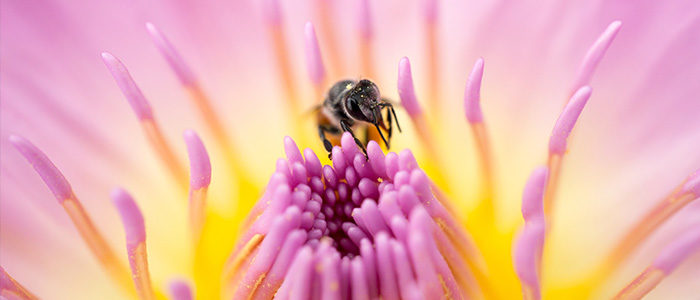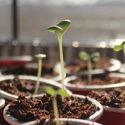It takes more than soil, water, and sunshine to make the world green. At least 30% of the world’s crops and 90% of all plants require cross-pollination to spread and thrive, and here in Canada, bees are our most important pollinators.
Unfortunately, bee populations here and around the world are in decline.
Climate change causes some flowers to bloom earlier or later than usual, leaving bees with fewer food sources at the start of the season. Bees suffer habitat loss from development, abandoned farms, and the lack of bee-friendly flowers. Some colonies collapse due to plants and seeds treated with neonicotinoid pesticides, or harmful parasites like mites.
Even one of Ontario’s most common species of bumble bee recently became an endangered species.
The good news is there are ways gardeners can help bee populations bounce back. Planting a bee-friendly garden will not only lead to healthy and vibrant plants, it will ensure that bees continue to play their critical role in our ecosystem.
Let’s explore five of the reasons bees are important to the environment.
5. Pollination
What’s your favourite summer crop? If you love apples, melons, cranberries, asparagus, or broccoli, you should tip your sun hat to our fuzzy, insect friends.
To germinate, these plants require the transfer of pollen from the male part of the flower (the anther) to the female part (the stigma). As bees move from flower to flower in search of nectar, they leave behind grains of pollen on the sticky surface, allowing plants to grow and produce food.
Bees earn their reputation as busy workers by pollinating billions of plants each year, including millions of agricultural crops. In fact, pollinators like bees play a key role in one out of every three bites of food we eat. Without them, many plants we rely on for food would die off.
4. Wild Plant Growth
It’s not just farm-grown fruits and vegetables that rely on pollinators to thrive. Many species of wild plants depend on insect pollinators as well. Bees are responsible for the production of many seeds, nuts, berries, and fruit, which serve as a vital food source for wild animals.
3. Food Source
Bees produce honey to feed their colonies during the cold winter months. Humans have harvested honey for thousands of years, but we aren’t the only ones who consider it a sweet snack. Critters like birds, racoons, opossums, and insects will raid beehives for a taste of nutritious honey (and bee larvae).
Bees themselves are also a part of the food chain. At least 24 species of bird, including the blackbird, ruby-throated hummingbird, and starling, prey on bees. Many spiders and insects, like dragonflies and praying mantises, eat bees as well.
2. Wildlife Habitats
Bees are known for their elaborate hives, but they also help build homes for millions of other insects and animals. Their role as pollinators is vital in the growth of tropical forests, savannah woodlands, and temperate deciduous forests. Many tree species, like willows and poplars, couldn’t grow without pollinators like bees.
Even your own garden serves as a home for hundreds of tiny creatures, from birds and squirrels to thousands of tiny insects. If bees disappeared, the animals that depend on these plants for survival would vanish as well.
1. Biodiversity
As pollinators, bees play a part in every aspect of the ecosystem. They support the growth of trees, flowers, and other plants, which serve as food and shelter for creatures large and small. Bees contribute to complex, interconnected ecosystems that allow a diverse number of different species to co-exist.
There is no doubting the importance of bees to our food supply. Without them, our gardens would be bare and our plates empty. But we should also remember the other reasons bees are important to the environment.
Let us know how you plan to help bee populations in your own garden!



